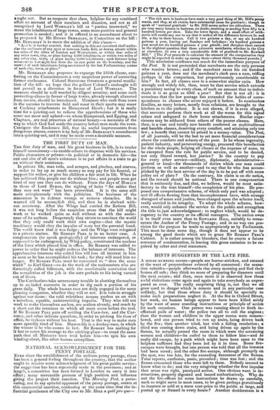NATIONAL ACKNOWLEDGMENT FOR THE PENNY POSTAGE.
EVER since the establishment of the uniform penny postage, there has been a general feeling throughout the country, that the author ought to receive some acknowledgment of his great public service : the suggestion has been repeatedly made in the provinces ; and at length, a committee has been formed in London to carry it into effect ; many mercantile persons of high position and influence giving the project their sanction. The Morning Post, a perse- vering, not to say spiteful opponent of the penny postage, sneers at this commercial sanction, confessing at the same time that the in- fluential gentlemen of the City owe to Mr. HILL a quid pro quo- " The rich men in business have made a very good thing of Mr. Hill's peons mania, and they, at all events, have substantial cause for gratitoSe; though to speak of national gratitude' to Mr. Hill seems rather too ridiculous. There are very many houses in business, no doubt, receiving or sending from fifty to hundred letters per diem. Take the lower figure, and a small effort of arith- metic will enable any one to see that it makes all the difference between 5s. and 50s. a day to these houses. Call it two guineas a day, or say six hundred guineas a year, leaving out Sundays and holydays six hundred guineas year saved are six hundred guineas a year gained; and therefore there cannot be the slightest question that those extensive merchants, whether in the City or elsewhere, do owe a very considerable debt of gratitude to Mr. Rowland Hill." [The Post proceeds to calculate the amount of the compensation they might be expected to make up among them—about thirty thousand pounds.] This admission confesses too much for the immediate purpose of the Post. It is not pretended that merchants are the only persons who receive letters ; and if the merchant saves his six hundred guineas a year, does not the merchant's clerk save a sum, trifling perhaps in the comparison, but proportionately considerable to him ? In fact, all classes save in a somewhat similar ratio. How strongly and widely felt, then, must be that service which extends a pecuniary saving to every class, of such an amount that to indivi- duals it is as great as 630/. a year! But that is not all : it is notorious that the low postage has extended the habits of corre- spondence to classes who never enjoyed it before. In numberless families, as many letters, mostly from relations, are brought to the kitchen as to the parlour. It is not shown, if it is even alleged, that servants perform their work at all the worse for this signal solace and safeguard to their home attachments. Similar expe- riences may be adduced from others of the poorer classes. Here, then, is a vast and totally new benefit conferred on multitudinous and humble classes, deserving every comfort, and attaining only too few; a benefit that cannot be priced in a money-value. The Post, of all journals, will be the last to set mere financial considerations above the comforts and solaces of the poor. Is he whose ingenuity, patient industry, and persevering energy, procured this benefaction for the whole people, helping all classes at the expense of none, to be excepted from the rule for public service, and to be denied, not only liberal reward, but justice? Is the country to pay for every other service—military, diplomatic, administrative— general or local—for thousands of duties which one man could perform as well as another—and to say that he who has accom- plished by far the best service of the day is to be put off with some paltry set of plate ? On the contrary, his claim is on the nation, and the reward should be national. There is one compensation that is eminently due, and that, we believe, would be most satis- factory to the man himself—the completion of his plan. He pro- posed one comprehensive scheme, of which only part was adopted ; and ill effects flowing from that incompleteness have, with strange disregard of sense and justice, been charged upon the scheme itself, really untried in its integrity. To adopt the whole scheme, how- ever, would only enhance the service to the public and strengthen the title to just acknowledgment ; to neglect which, would be de- rogatory to the country or its official managers. The nation owes it to itself even more than to ROWLAND HILL, suitably to remu- nerate the Author of the Penny Postage; and in no way can pro- vision for the purpose be made so appropriately as by Parliament, This must be done some day, though it does not appear to be among the good deeds which are to grace Sir ROBERT PEEL'S Cabinet. It is rather among his blunders, that he courts a future sentence of condemnation, in leaving this gross omission to be re- paired by other and rival statesmen.


























 Previous page
Previous page